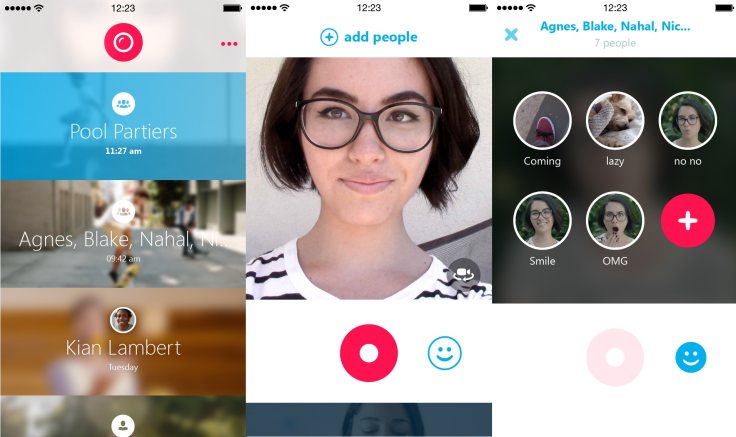Skype Qik: Microsoft’s Video-Messaging App Works On iPhone, Android And Windows Phone

Microsoft Corporation is wading into messaging with a simple new video-messaging app that works on just about any smartphone, be it an iPhone, Android or Windows Phone. Branded as Skype Qik, the free app is more Vine than FaceTime, with some privacy-minded features helpful for those of us prone to oversharing.
Microsoft’s Skype division unleashed Skype Qik on Monday, with a simple interface that allows users to send short, video-only messages. A number of apps are nipping at the heels of the aging text message and gaining users by the hundred millions, and Microsoft wants smartphone users to know that the party is just getting started.
Skype Qik is not a completely novel concept, but it does have some unique features: an “undo” ability that allows users to delete a message after it’s already been sent and a 42-second time limit on each message.
The limit, Microsoft says, is to maintain that everyone in a conversation gets a chance to speak. You know the kind of person that leaves a two-minute voicemail? Microsoft’s Dan Chastney says the Skype Qik team wants to make sure they’re not ruining the conversation for everybody.
“Everybody has that one friend who likes the sound of their own voice, and we thought it would really slow things down” to have them sending out really long videos, Chastney said. The 42-second limit prevents “people like that from bogging down the conversation.” And yes, it’s also a reference to the “answer to life, the universe and everything” from the “The Hitchhiker’s Guide to the Galaxy.”
Skype Qik is an attempt to tap into the popularity of Snapchat, for sure. But by setting the expiration date on all messages at two weeks, it works more like a FaceTime chat room, where users can share short video messages whenever the mood strikes them. Chastney said the time limit on messages makes Skype Qik easier to navigate.
“People don't go back to review bits of an [in-person] conversation, so why worry about managing this inbox of content?” he said.
If you have ever sent a drunk text message, angry email or a picture message that you wish you could delete off of your ex’s phone, then the Skype Qik team thinks its app is for you. It offers the ability to delete messages after they are sent, regardless of whether they have been viewed.
If the recent leak of stolen Snapchat images and videos is any indication, the youngest generation might just be a little too comfortable sharing their experiences online, but the feature is also a way to make users feel more comfortable communicating with video.
“Even just the awkwardness of seeing your own face on screen talking,” Chastney said. “Most people don't like hearing their own voice, but that can be amplified when you see your own face talking as well.”
The Skype team is not going to actively go after the kinds of third-party software blamed for the recent spate of Snapchat leaks, Chastney said, nor will it prevent screenshots. Instead, Skype Qik users will have to rely on the “social contract” that exists within any communication.
“It’s really about conversations and casual messaging, not about sharing or saving it outside the app or forwarding it on, which we don’t allow users to do,” he said.
Skype Qik is built for mobile, Chastney said, an app developed for smartphones, not PCs or Xboxes or anything else, for that matter. But its short and sweet video messages seem tailor-made for smartwatches like the Moto 360 and forthcoming Apple Watch. Both have bright, colorful screens that might be fine for watching a short video but limited battery life that might make real-time video calls difficult.
“I think there’s going to be a lot of innovation in the area and it’s exciting to watch,” Chastney said. “No pun intended.”
For now, its developers are looking forward to how (and if) users respond to Skype Qik on mobile. But is it an early move that could allow Microsoft to be the first video-messaging platform on the Apple Watch?
“We’re trying to understand the capabilities of these devices and how they fit into users' lives," he said. "As we explore that further, I’m sure we’ll be able to integrate something into the overall experience."
© Copyright IBTimes 2024. All rights reserved.





















